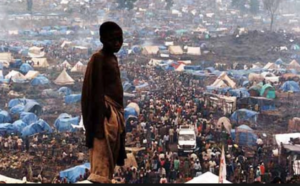After reading Emergency Sex (and Other Desperate Measures) I learned a lot about the humanitarian aid sector and the real- life journeys of those who are working in this field. The three main characters of the book, Ken, Heidi, and Andrew, all learned a lot throughout the course of the book and through their different experiences. Each story had different aspects that highlighted this journey, but I think the character that transformed the most was Ken.
Ken’s moral career follows a very clear map of the idea of the missionary, mercenary, mystic, misfit model that J has proposed. Goffman defined a moral career as, “Any social strand of any person’s course through life… the regular sequence of changes that career entails in the person’s self and in his imagery for judging himself and others.” One’s identify changes throughout different contexts that they are put through in life. This depends on many factors, but is especially influenced by age and the social context that one is in (Arcaro).
Ken starts out his journey at Harvard Law School, where he has very little knowledge of the humanitarian aid sector and the work that is truly involved in it. However, he is yearning to do more than just become another corporate lawyer and wants to make a difference in the world. Ken states, “I’m 25 and have never done anything of moral significance in my life” (10). Ken starts his moral career as a missionary and goes to Cambodia with the idea that he is ready to do good and make a change. In Cambodia, he is very optimistic and enjoys his time meeting new people, partying, and leading a successful mission. He leaves Cambodia feeling accomplished, where he was able to help get 90% of Cambodians that were registered to vote and the UN got more involved with the government. “We actually made peace” (86) Ken said as he left Cambodia.
Going to Somalia, Ken starts to experience more of what it is actually like doing humanitarian work. Ken starts moving toward the mercenary stage after he is caught in crossfires and witnessed many people dying. He starts to understand the violence that happens, and says, “I hadn’t thought of that yet. How many we killed” (164). The hope to do good that Ken had when going to Cambodia starts to fade here and he starts becoming more skeptical of humanitarian work.
Heading to the mystic phase, Ken goes to Rwanda with a much different attitude than when he entered Cambodia or Somalia. He is much more aware of the challenges that there are with humanitarian work and although he is more hesitant, he still goes. After Matt dies in Rwanda, Ken has to tell his Dad what has happened. “Sitting in Matt’s dad’s office, I managed to convince myself to believe in this work again. But I don’t. It’s a lie” (225). This is a changing point for Ken as he becomes a skeptic and leaves Rwanda as a misfit (J.).
Emergency Sex (and Other Desperate Measures) comes to an end with Ken being very aware of humanitarian work and all the issues involved with it. He became very wary of the aid sector and understands the realities around it. Ken’s journey ends with him saying, “Perhaps I should just admit that I now understand the world is corrupt and brutal, that most nations look out only for their own interest, and people seldom rush to dangerous act of selfless sacrifice” (294). This is a very different attitude than the beginning of the book, and I wonder if his attitude has changed? Or if he still is a skeptic of the aid sector and believes the world is “corrupt”?
Rwanda
Works Cited:
Cain, Kenneth, Heidi Postlewait, and Andrew Thomson. Emergency Sex and Other Desperate Measures: A True Story from Hell on Earth. New York: Hyperion, 2004. Print.
Arcaro, Tom. The Moral Career of a Humanitarian Aid Worker. 25 Jan. 2016.
J. Missionary, Mercenary, Mystic, Misfit. Evil Genius Publishing, 2013. Print.


2 Comments
I enjoyed reading your post! I wrote about Ken for mine as well so it was interesting to compare what you thought of his moral career. Overall, we had pretty similar views and both talked about how he became more skeptical about the work he was doing and about his ability to save the world as time went on. I also like how you tied in the part about Ken telling Matt’s dad about his death because that was definitely a pivotal point in his moral career.
Great post overall! I think that your analysis of Ken’s moral career through J’s model is very accurate and brings up a lot of key moments for him during his journey. I also love how you have imbedded so many quotes into your post, I think it really helps us as the readers to understand his own though process and moral conflict in each moment. I definitely would want to ask him some of the same questions that you mentioned like how his work in the aid sector has influenced his perceptions of the world/his perceptions of himself?